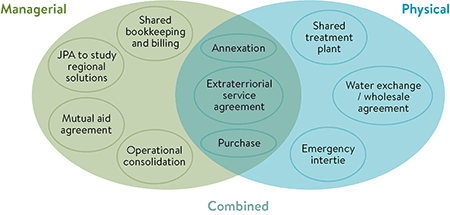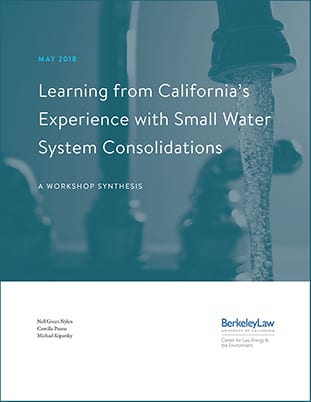May 2018
California recognizes a human right to safe, affordable drinking water. However, small and disadvantaged communities can find it especially challenging to fund the water systems necessary to achieve this goal. Small water systems are responsible for the bulk of the state’s drinking water quality violations, and an estimated 300 disadvantaged communities in California are served by systems that fail to meet state drinking water standards.
Water system consolidations can create economies of scale that help address persistent water system inadequacies in small and disadvantaged communities. More than 100 consolidation projects have been completed or are ongoing in California, and many more communities are likely to pursue consolidations in the future. While consolidation offers many potential benefits for communities served by unreliable water systems, the costs and benefits associated with different consolidation options have not been well documented. During the current legislative session, legislators have introduced several legislative proposals to address perceived needs related to consolidation.
The Workshop and the Workshop Synthesis Document
This project begins to take stock of past and current consolidation efforts—and the lessons they provide—with the goal of helping to accelerate cost-effective solutions for near-term water needs and long-term water system resilience. A daylong workshop held at UC Berkeley in March 2018 aimed to identify key lessons learned and emerging issues from California’s experience to date with small water system consolidations. This document synthesizes that facilitated dialogue, exploring the factors that drive and influence consolidations. It enumerates barriers to effective consolidations and identifies potential solutions for overcoming those barriers, highlighting which entities may be best situated to implement them.
In addition to laying the foundation for further constructive and inclusive dialogue, this work aims to inform the development of legislative and administrative policy proposals and a future research agenda.
Download the Workshop Synthesis:
Learning from California’s Experience with Small Water System Consolidations (May 2018)
See Coverage in Water Deeply:
Dozens of Water Systems Consolidate in California’s Heartland (June 11, 2018)
See Our Op-Ed in Water Deeply:
Saving Troubled Water Systems Requires Flexible Solutions, Not Mandates (September 10, 2018)
For More Information:
Contact Nell Green Nylen, Senior Research Fellow, Wheeler Water Institute, Center for Law, Energy & the Environment
This work was funded by the Water Foundation and Credit/Debit Card Tying Cases Cy Pres (Zelle LLP Lead Counsel).

